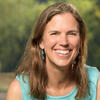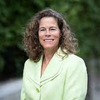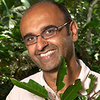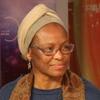List of Speakers and Panelists
 | Gamma Galudra Director, RECOFTC Indonesia |
| Building Partnerships for Forest Restoration PanelThu 2/2 5:00pm EST |
 | Eva Garen Program Director Environmental Leadership and Training Initiative (ELTI) |
Based at Yale University, Dr. Eva Garen has spent almost twenty-five years working on the social aspects of conservation and development in the tropics. Prior to becoming the Director of ELTI in 2012, Eva was a technical advisor on the social aspects of REDD+ with Conservation International’s Science and Knowledge Division. Eva also worked with USAID’s Forestry and Biodiversity Teams in Washington D.C. as a Science and Technology Policy Fellow with the American Association for the Advancement of Science. For her postdoctoral research in Panama at STRI, she worked with cattle ranchers and smallholders on issues of native species reforestation and land restoration in mosaic tropical forest landscapes. Eva completed her M.E.S. and Ph.D. at the Yale School of the Environment, with a concentration in social ecology.
 | Eva Garen Program Director Environmental Leadership and Training Initiative (ELTI) |
Based at Yale University, Dr. Eva Garen has spent almost twenty-five years working on the social aspects of conservation and development in the tropics. Prior to becoming the Director of ELTI in 2012, Eva was a technical advisor on the social aspects of REDD+ with Conservation International’s Science and Knowledge Division. Eva also worked with USAID’s Forestry and Biodiversity Teams in Washington D.C. as a Science and Technology Policy Fellow with the American Association for the Advancement of Science. For her postdoctoral research in Panama at STRI, she worked with cattle ranchers and smallholders on issues of native species reforestation and land restoration in mosaic tropical forest landscapes. Eva completed her M.E.S. and Ph.D. at the Yale School of the Environment, with a concentration in social ecology.
 | Bradford Gentry Frederick K. Weyerhaeuser Professor in the Practice of Forest Resources Management and Policy, Yale School of the Environment Co-Director of the Center for Business & the Environment at Yale and Director of the Research Program on Private Investment and the Environment at Yale |
| Panel: Financing Forest Protection and RestorationSat 1/29 9:00am EST |
 | Grizelle González Director International Institute of Tropical Forestry US Forest Service |
Grizelle started working at the U.S. Department of Agriculture, U.S. Forest Service, International Institute of Tropical Forestry (the Institute) in 2000. At the Institute, she has served in roles as a Postdoctoral Scientist, Research Ecologist, Director of the Sabana Field Research Station, R&D Project Leader, Assistant Director for Research and currently serving as Institute Director. As the R&D Lead at the Institute, she has helped guide the science, administration and communication of research related to Tropical Forests and Grasslands currently occurring in over 10 countries, and in collaboration with more than 45 Institutions and 150 scientists. She represents the Institute in interactions with the Regions, Stations, and external partners, helping to shape the research agenda, budgetary decisions, safety procedures, communicating results to partners and the public and contributing to the coordination of national and international research efforts.
Dr. González is member of the editorial boards of the Caribbean Journal of Science, the Caribbean Naturalist, Forests, and Frontiers in Forests and Global Change (section Forest Disturbance). Grizelle is also a supporter of arts and science collaborations, and believes science is central for the sustainable development, and resiliency of tropical America. She became a certified forest therapist in August 2020. Dr. González holds a Ph.D. from the University of Colorado-Boulder in Biological Sciences; a M.Sc. Degree in Biology; and a B.Sc. in Biology from the University of Puerto Rico.
| Panel I - Feedback System in the TropicsThu 2/2 1:00pm EST |
 | Emma Grover Conference Co-chair, MESc Candidate |
Emma Grover is a second-year Master of Environmental Science candidate at the Yale School of the Environment. She is advised by Dr. Simon Queenborough. In a broad sense, her interests include tropical forest ecology, effective environmental science communication, biodiversity conservation, and nature based solutions to climate change. She seeks to investigate how tropical plant populations might respond to our changing climate, increasing our understanding of community resiliency in forest ecosystems. For her MESc thesis, she studies how leaf functional traits, with a focus on drip-tips (long leaf apices commonly found in wet tropical forests), vary based on tree developmental stage and life history strategy. Emma holds a Bachelor of Science in Environmental Science and a minor in Spanish from the University of Virginia.
| Opening Plenary: Introductory Remarks and Keynote AddressesFri 2/3 9:00am EST |
 | Karen Holl Professor of Environmental Studies University of California, Santa Cruz |
Karen Holl is a Professor of Environmental Studies at the University of California, Santa Cruz. Her research focuses on understanding how local and landscape scale processes affect ecosystem recovery from human disturbance and using this information to restore damaged ecosystems. Her current research focuses in rain forests in Latin America and chaparral, grassland and riparian systems in California. She advises numerous public and private agencies on land management and restoration; recently she has been working to improve outcomes of the effort of the many large-scale tree growing campaigns. In 2008 she was selected as an Aldo Leopold Leadership Fellow and is committed to communicating with policy makers and the public. She teaches courses in restoration ecology, conservation biology, and environmental problem solving. She served as chair of the Environmental Studies Department and as the faculty director for the Ken Norris Center for Natural History at UC Santa Cruz. She is a Fellow of the California Academy of Sciences and the Ecological Society of America, and was the 2017 winner of the Theodore Sperry Award of the Society for Ecological Restoration. Her Primer of Ecological Restoration was published by Island Press in 2020.
 | Deborah Lawrence Professor of Environmental Sciences University of Virginia; Chief Scientist, Calyx Global |
Deborah Lawrence is an Environmental Sciences professor at the University of Virginia, where she conducts global forest and climate research. She is also the Chief Scientist at Calyx Global, an independent provider of ratings and other carbon market analytics for the rapidly growing carbon market. Her research focuses on the links between tropical deforestation and climate change. She has spent the past 25 years doing field-based research in Indonesia, Costa Rica, Mexico and Cameroon. Most recently, she has been using global climate models to explore the cumulative effect of tropical land use decisions, exploring the climate impact of land allocation among food crops, biofuels and forests across the globe.
Previously, she was a science advisor to the US Department of State, Office of Global Change (the international climate change policy and negotiations unit). She later helped establish SilvaCarbon, a US federal interagency program for forest carbon measurement and monitoring. Deborah has also served on the Technical Committee on Agriculture, Forestry and Other Land Use at the American Carbon Registry. She received a BA in Anthropology from Harvard University, and a PhD in Botany from Duke University. Deborah’s favorite activities include tending to her climate-forward backyard, where she must constantly defend her beloved chickens from foxes.
| Panel I - Feedback System in the TropicsThu 2/2 1:00pm EST |
 | Simon Lewis Professor of Global Change Science, University of Leeds & University College London |
Simon Lewis is a Professor of Global Change Science, at both University College London and the University of Leeds. HIs main research interests are to understand how humans are changing the Earth system, with a focus on the topics and the global carbon cycle. He is interested in net zero plans, negative emissions, and greenwash by governments and companies. His team’s scientific discoveries include the globally significant carbon sink in intact tropical forests, the evolution of the carbon sink; and the world’s largest tropical peatland complex in central Congo. He co-founded and co-manages the African Tropical Rainforest Observatory (www.afritron.net). In 2018, he published, with Mark Maslin, The Human Planet: How We Created the Anthropocene (Penguin), and exploration of the science, history and politics of the Anthropocene, an Observer book of the year and shortlisted for the Azimov Prize.
| Panel I - Feedback System in the TropicsThu 2/2 1:00pm EST |
 | Yadvinder Malhi Professor of Ecosystem Science, University of Oxford; Senior Research Fellow, Oriel College |
Yadvinder Malhi CBE FRS is Professor of Ecosystem Science at the Environmental Change Institute, School of Geography and the Environment, and Senior Research Fellow at Oriel College. Professor Malhi explores the functioning of the biosphere and its interactions with global change, including climate change. He has a particular fascination with and love for tropical forests, though he has recently been spotted in ecosystems ranging from savannas, the Arctic, tropical coral reefs and Oxfordshire’s woodlands and floodplain meadows. He looks at how natural ecosystems may be shifting in response to global atmospheric change, and how protecting or restoring natural ecosystems can help tackle climate change, and help adaptation to the consequences of climate change.
His team at the Environmental Change Institute is known for collecting intensive field data from fascinating but sometimes tough and remote forests. They have ongoing programmes of research in Asia, Africa, the Amazon and Andes regions, and Oxford’s own Wytham Woods. A new recent focus has been on nature recovery and biodiversity restoration in the UK. While addressing fundamental questions about ecosystem function and dynamics, his research findings are significant for conservation and adaptation to climate change. He is a Trustee of the Natural History Museum of London, President-Elect of the British Ecological Society, chairs a number of programmes on biodiversity at the Royal Society, and is a scientific advisor on nature restoration for the UK government and the government of Scotland.
He leads an active Ecosystem Dynamics research lab focussing on forest vegetation-atmosphere interactions, employing field studies, satellite remote sensing and ecosystem modeling.
| Panel I - Feedback System in the TropicsThu 2/2 1:00pm EST |
 | Bryan McCann Vice President, Markets Emergent |
Bryan is the Vice President, Markets at Emergent. He works closely with corporate partners to help meet their climate objectives. Prior to joining Emergent, Bryan was a Senior Associate at the Global Development Incubator, supporting Emergent on an interim basis. Bryan is a management consultant by trade, working with Fortune 100 companies in Canada and the US with Oliver Wyman, a top-five global consultancy. He also has significant global development experience from his work with One Acre Fund, a large agricultural development social enterprise, and the World Food Programme in Rome. Bryan holds a Bachelor of Commerce degree from Queen’s University and a Master’s of Arts in International and Development Economics from Yale University.
| Panel: Financing Forest Protection and RestorationSat 1/29 9:00am EST |
 | Pamela McElwee Professor of Human Ecology Rutgers University |
Pamela McElwee is Professor of Human Ecology at Rutgers and has conducted fieldwork in Southeast Asia over the last 25 years on the topics of biodiversity, ecosystem services, and climate change. Her first book, Forests are Gold: Trees, People and Environmental Rule in Vietnam won the EUROSEAS prize for best social science book on Southeast Asia. She was awarded a 2019 Andrew Carnegie Fellowship to work on her next book about the environmental legacies of the Vietnam War and the politics of post-war restoration efforts. McElwee has also served as lead author for the Intergovernmental Panel on Climate Change (IPCC), the Intergovernmental Science-Policy Platform for Biodiversity and Ecosystem Services (IPBES), and on the first joint IPCC/IPBES report on Biodiversity and Climate Change. She holds a joint Ph.D. in forestry and environmental studies and anthropology from Yale.
| Panel: Political Ecology and Tropical Forest RestorationThu 1/27 11:00am EST |
 | Florencia Montagnini Senior Research Scientist, Director, Program in Tropical Forestry and Agroforestry Yale School of the Environment |
| Introductory Remarks and Opening Keynote + Q&AThu 1/27 9:00am EST |
 | Musonda Mumba Director, The Rome Centre for Sustainable Development United Nations Development Programme |
Musonda Mumba is the Director for The Rome Centre for Sustainable Development under the United Nations Development Programme (UNDP), in close collaboration with the Italian Government’s Ministry of Environment and Ecological Transition. The Centre focuses on three priority areas: climate change, sustainable development, and nature protection. In her role, Mumba provides strategic leadership on these matters through convening, collaboration, connecting, and co-creation as the world navigates complexity and uncertainty, with the aim of achieving the UN’s Sustainable Development Goals collectively. She is also the Chair of the Global Partnership on Forest and Landscape Restoration (GPFLR) and Vice-Chair of the Collaborative Partnership on Forests (CPF). She has over 25 years’ experience in environmental and conservation issues globally, and has published widely in various journals, newspapers, articles, and contributed to book chapters. Before joining UNDP, Mumba was the head of United Nations Environment Programme – UNEP’s Terrestrial Ecosystems Programme and served in various roles over a period of 12 years. A Zambian national, she received her BSc. Ed. at University of Zambia and her Ph.D. at University College London in wetland conservation and hydrology.
| Closing Keynote + Q&ASat 1/29 1:30pm EST |
 | Ivone Namikawa Forest Sustainability Senior Consultant, Klabin |
| Building Partnerships for Forest Restoration PanelThu 2/2 5:00pm EST |
 | Milagre Nuvunga Executive Director, MICAIA Foundation |
I am a Mozambican citizen, born and brought up in Mozambique, and trained as a forester. After 15 years in government in positions that included Director of Forestry Research and National Director for Forestry and Wildlife in Mozambique, I worked internationally for 10 years, including with the UN in New York, supporting forestry work in African and Latin American countries, and the Ford Foundation, working on environment and community development issues in Eastern Africa. I moved back to Mozambique in 2008 as co-founder of the MICAIA family of institutions (comprising a Mozambican foundation and a social enterprise, as well as a UK based charity run by a volunteer board), where I serve as Executive Director of MICAIA Foundation.
My main professional interest is the development of approaches to strengthening community control over land and the natural resources that support local livelihoods, and ensuring women’s powerful participation in decision making, as well as engagement in gainful activities.
I am currently exploring governance arrangements that will bring communities and other actors (government/private sector) to adopt sustainable landscape development principles and inclusive business approaches, seeking a balance between conservation and local development objectives.
Interesting fact: I was the first female national director for forestry and wildlife in Africa.
| Panel III - Sustainable Development and Tropical ForestsSat 2/4 9:30am EST |
.jpg)